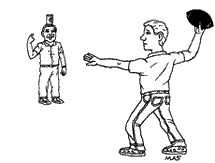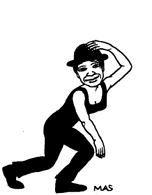
Movies
Varsity Blues (Paramount Pictures). Critics say this film is pretty fun for a formula sports flick: "brisk and wholehearted and smarter than you expect" (Owen Gleiberman, Entertainment Weekly). Dawson's Creek star James Van Der Beek plays a second-string quarterback thrust into the spotlight of a football-obsessed Texas town when the star is injured. The benefits that come with the new position (free beer, cheerleaders slathered in whipped cream) get lots of screen-time, and at points the film is almost "a poor man's Porky's" (Andy Seiler, USA Today). John Anderson pans it in the Los Angeles Times ("a trashy little movie about drinking, football and drinking"), saying it "pretends to moralize about the very behavior it milks for every giggle it can get." (Get all the Van Der Beek-cake you can handle on this fan site.)
At First Sight (MGM). Critics are down on this based-on-a-true-Oliver-Sacks-story of a man (Val Kilmer) who regains his sight after an operation encouraged by his sighted girlfriend (Mira Sorvino). Rod Dreher of the New York Post is scathing, dismissing it as "ooey-gooey schmoopie slop" and "ersatz romantic tapioca" and comparing the personality of Kilmer's character to that of Snuggles the fabric-softener bear. Not everyone's this harsh, but the film has only one true supporter, the Los Angeles Times' Kevin Thomas, who deems it "an exceptionally touching and provocative love story." (This fan site has lots of stills.)
In Dreams (DreamWorks). Most agree that this "dismayingly schlocky and literal-minded thriller" (Gleiberman, Entertainment Weekly) is leavened only by a fine performance by Annette Bening as a woman plagued by the dreams of a serial killer. Director Neil Jordan (The Butcher Boy) gives viewers plenty to look at--creepy underwater sets, lush dream sequences--but the film comes up short anyway. As Roger Ebert says, "[T]his is a well-made bad movie" (Chicago Sun-Times). (For a review by Slate's David Edelstein, click here. Find out more about Neil Jordan in this profile in Time.)
Books
Duane's Depressed, by Larry McMurtry (Simon & Schuster). Good, not great, reviews for the final novel in the trilogy that began with The Last Picture Show and continued with Texasville. Critics say that although this is not on a par with McMurtry's finest work, "every page is as welcome as a letter from home" (Kyle Smith, People). Others think the extended musing on the depression of 62-year-old oilman Duane Moore focuses so much on his malaise as to become boring, but most agree with Malcolm Jones of Newsweek: "both heartbreaking and hilarious, sometimes on the same page." (Read more about McMurtry in this Newsweek article.)
The Intuitionist, by Colson Whitehead (Anchor Books). Critics describe this detective novel, the author's first, as "part Thomas Pynchon, part Ralph Ellison" (Dan Cryer, New York Newsday) and praise Whitehead as a refreshingly original voice. The story follows Lila Mae Watson, the first black elevator inspector in a New York-like metropolis in the 1940s. Watson is an "intuitionist," one of a minority of inspectors who judges elevators by intuition, as opposed to the empiricists, who inspect in the traditional fashion. The twisting plot explores race relations, with elevators serving as metaphors for social mobility and transcendence. Mark Rozzo of the Los Angeles Times is not as impressed as most, saying the book "diverts more than it excites." (Listen to the author reading a passage from the book here, and read an excerpt here.)

Theater
Fosse: A Celebration in Song and Dance (Broadhurst Theatre, New York City). Reviewers are split on this retrospective of the work of Broadway choreographer Bob Fosse. Some call it a testament to Fosse's genius, with fulsome, blurb-ready praise: "The old razzle-dazzler has done it again--posthumously ... an inevitable hit, a galvanizing eruption of energy, panache and arrogantly surefooted stagecraft" (Terry Teachout, Time). Others, contrarily, find evidence of Fosse's limits: The New York Times' Ben Brantley writes, "Numbers that, in the context of their original shows, sparkled with wit and vitality often register as repetitive examples of virtuosic proficiency." Some are more critical, calling the dances "dated" (Amy Gamerman, the Wall Street Journal). (An "under construction" Fosse site lets fans discuss the master. You can buy tickets at the show's official site.)
Recent "Summary Judgment" columns
- Movie--Affliction;
- Movie--Hilary and Jackie;
- Movie--The Hi-Lo Country;
- Book--The Haunted Wood: Soviet Espionage in America--The Stalin Era, by Allen Weinstein and Alexander Vassiliev;
- Book--Note Found in a Bottle: My Life as a Drinker, by Susan Cheever;
- Book--Glamorama, by Bret Easton Ellis.
- Movie--A Civil Action;
- Movie--The Thin Red Line;
- Movie--Down in theDelta;
- Movie--Hurlyburly;
- Movie--Theory of Flight;
- Book--Careless Love: The Unmaking of Elvis Presley, by Peter Guralnick;
- Book--The Jew of New York, by Ben Katchor.
- Movie--Patch Adams;
- Movie--The Faculty;
- Movie--Stepmom;
- Movie--Mighty Joe Young;
- Book--Hundred Dollar Holiday, by Bill McKibben;
- Book--The Vintner's Luck, by Elizabeth Knox.
- Movie--The Prince of Egypt;
- Movie--You've Got Mail;
- Movie--The General;
- Book--Blind Man's Bluff: The Untold Story of American Submarine Espionage, by Sherry Sontag and Christopher Drew, with Annette Lawrence Drew;
- Book--Opened Ground: Selected Poems, 1966-1996, by Seamus Heaney;
- Book--The Unknown Matisse: A Life of Henri Matisse, The Early Years, 1869-1908, by Hilary Spurling.